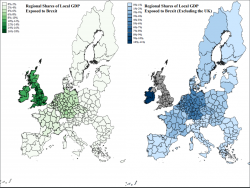Channel 4 is moving 300 staff out of London, with most going to a major British city.* The HQ2 shortlist has just been announced, and seven city-regions are on it: Bristol, Cardiff, Glasgow, Leeds, Liverpool, Greater Manchester and the West Midlands. The winner will be announced on 1 October. So, who should win? And what effects could the move have on … Continue reading “Channel 4’s HQ2: Where and Why?”
A Voice for UK Regions Now
In this blog, Frank van Oort, Erasmus University Rotterdam, summarises the outcomes from the four workshops City-REDI recently ran across the UK. Running among hundreds of people for the Virgin train from London’s Kings Cross to Leeds on a Sunday morning with exactly 5 minutes boarding time provided, makes you realise how uncomfortably tight the UK can plan … Continue reading “A Voice for UK Regions Now”
The 2018 Retail Crisis Catches Up With Marks and Spencer
Recently, the UK retail industry has been facing six challenges, namely: 1) a squeeze in incomes; 2) the shift to online shopping; 3) changing tastes; 4) rising overheads; 5) high debt; and 6) simply too many shops. Following the closure of Toys R Us, Maplin and certain New Look stores, approximately 5,500 people are already … Continue reading “The 2018 Retail Crisis Catches Up With Marks and Spencer”
The Economic Impacts of Brexit on the UK, Its Regions, Its Cities and Its Sectors – Regional Participatory Workshop Presentations Are Now Available
City-REDI recently ran a series of regional participatory workshops to ensure that the outputs from the ESRC funded project “The Economic Impacts of Brexit on the UK, its Regions, its Cities and its Sectors”, connects with broader public policy arenas at the national and regional level. The presentations from the workshops are now available: Devolved Administrations – 4th May … Continue reading “The Economic Impacts of Brexit on the UK, Its Regions, Its Cities and Its Sectors – Regional Participatory Workshop Presentations Are Now Available “
The University of Birmingham’s Impact on the Local Economy
Birmingham was recently ranked as the UK’s number one destination for foreign direct investment – creating over 12,000 jobs in the last 10 years. The West Midlands ranks as the UK’s number one region for manufacturing technology jobs, accounting for 60% of the country’s exports. The focal point for explaining the region’s success often surrounds … Continue reading “The University of Birmingham’s Impact on the Local Economy”
Flexibility Differences between Lean and Agile Production in the West Midlands Automotive Supply Chain
The majority of studies which have investigated lean and agile production have explored each of these production concepts in silos, which is a growing trend in the recent literature. Given that a number of studies assert that flexibility is an essential factor for differentiating lean and agile production there is an important need to explore … Continue reading “Flexibility Differences between Lean and Agile Production in the West Midlands Automotive Supply Chain”
Markle Sparkle and the Royal Wedding 2018: Frocks, Rocks and the Local Economic Impacts of Weddings
The wedding of Prince Harry and Meghan Markle on Saturday, 19th May 2018, at St George’s Chapel in the grounds of Windsor Castle raises interesting questions regarding the relationship between weddings and local economic development. There can be no question that weddings are big business and that a Royal Wedding, in particular, is exceptionally big business that … Continue reading “Markle Sparkle and the Royal Wedding 2018: Frocks, Rocks and the Local Economic Impacts of Weddings”
City-REDI mentioned in the House of Commons
Research led by Professor Raquel Ortega-Argiles, City-REDI, University of Birmingham, was referenced in a House of Commons debate on the 26th April 2018. The research suggests that the UK’s cities and regions which voted for Brexit are also the most economically dependent on EU markets for their prosperity and viability. These cities and regions are … Continue reading “City-REDI mentioned in the House of Commons”
‘Plumber phobia’ and the Brexit services trade dilemma
This blog was originally posted on the Birmingham Business School blog. Europe Day is upon us again and provides an ideal opportunity to reflect upon European integration in the face of Brexit. In 1985, the 9th May was designated as Europe Day by the European Union (EU) – then the European Community – to celebrate the … Continue reading “‘Plumber phobia’ and the Brexit services trade dilemma”
Wolverhampton Wanderers Return to the English Premier League: Football, Property and Local Economic Development
Greetings from Singapore. Singapore is perhaps a strange place to reflect on Wolverhampton Wanderers and its return to the English Premier League. But, like Wolverhampton, Singapore is a very special place with an interesting collection of strategic assets. All this is to argue that a place, a city, a town or a ward is defined … Continue reading “Wolverhampton Wanderers Return to the English Premier League: Football, Property and Local Economic Development”











